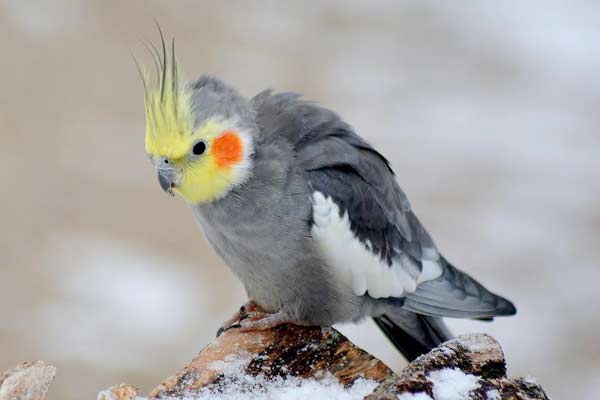If you own a cockatiel, you may have noticed that they sometimes grind their beak. It is important to note that beak grinding is different than beak chewing, which is destructive behavior.
Cockatiels make this scratching sound by rubbing the top and bottom mandibles together. This is expected behavior for cockatiels, and there are several reasons why they do it.
Cockatiels grind their beaks as a way to relieve boredom or stress. It’s also believed that birds typically groom themselves when they are bored.
In some cases, beak grinding can also be a sign of illness. If your cockatiel is grinding its beak more than usual, it’s essential to take them to the vet to rule out any health issues.
Why Do Cockatiels Grind Their Beaks?
Even though beak grinding can sometimes be scary, it is a very common behavior in cockatiels. Cockatiels grind their beaks for various reasons, the most common being boredom and stress relief.
In the wild, birds spend a lot of time preening their feathers and keeping themselves clean. Beak grinding is also believed to be a way for birds to groom themselves. When birds are bored, they may start to tend more frequently as a way to pass the time.
The birds feel bored in the same environment for a long time without any changes. The boredom makes the cockatiels anxious, and they begin to look for something to do.
The cockatiels start grinding their beaks when they think there is no chance for anything new to happen.
Studies show that cockatiels start to grind their beaks more in an environment with little stimulation.
For instance, cockatiels in cages with few toys or no outdoor access are more likely to grind their beaks than cockatiels with various things to do. This is because cockatiels need mental and physical stimulation to stay healthy and happy.
Just like humans, birds can get stressed out by their environment. If there are too many changes happening in the home or if the birds feel threatened, they may start to grind their beaks as a way to cope. Cockatiels may also grind their beaks as a way to relieve stress.
Besides, cockatiels grind their beak as a sign of contentment or excitement. This happens when the cockatiels are very happy with their current situation.
For example, if you just got a new cockatiel and they are already grinding their beak, it’s a good sign that they are settling in well. They could contend with their new home and surroundings.
When these birds are sick, they usually have a decrease in appetite and may start to grind their beaks as a way to get food.
In some cases, beak grinding can also be a sign of illness. Hopping, head bobbing, and increased vocalization are common signs of disease in cockatiels.
If your cockatiel displays any of these behaviors, it’s essential to take them to the vet as soon as possible.
Do Beak-Grinding Harm Cockatiels?
Beak grinding is a natural behavior for cockatiels and usually doesn’t cause harm. However, if your cockatiel is grinding their beak more than usual, it could harm them.
They may wear down their beak, which can lead to infection. Additionally, cockatiels who grind their beaks excessively may develop a condition called Bruxism, when the bird starts grinding their teeth.
Bruxism can be painful and can cause the bird to lose their appetite. Always observe your cockatiel’s beak to ensure they’re not grinding it too much. If you notice any redness or swelling, take them to the vet as soon as possible.
How Can I Prevent Beak Grinding?
There are several things you can do to prevent beak grinding in cockatiels. First, make sure that your cockatiel has plenty of things to do. This includes toys, perches, and access to the outdoors.
Cockatiels need mental and physical stimulation to stay healthy and happy, so providing them with a stimulating environment is essential.
Try to keep the environment as stable as possible. You should also try to avoid making any sudden changes in the home. Too many changes can stress your cockatiel and cause them to grind their beak.
Finally, make sure that your cockatiel is getting enough exercise. Cockatiels who don’t get enough exercise are more likely to be bored and stressed, leading to beak grinding.
Provide your cockatiel with plenty of toys and perches, and take them out of the cage for a few hours each day.
Sometimes, you may be unable to stop your cockatiel from grinding its beak. For instance, if your cockatiel is sick, they may continue to grind their beak even with treatment.
If this is the case, you can try to provide them with a softer material to grind on. Alternatively, you can consult your vet for more advice.
How Often Should I Clean My Cockatiel’s Beak?
You should clean your cockatiel’s beak weekly with a soft cloth or toothbrush. Just be sure to avoid using harsh chemicals or soaps, as these can irritate the bird’s skin. Additionally, it would be best to trim your cockatiel’s beak every few months to prevent overgrowth.
Cleaning helps to remove any bacteria or dirt that could be trapped in the beak. It also helps to keep the beak healthy and free from infection. Trimming the beak can also help prevent overgrowth, making it difficult for the bird to eat.
Failure to clean and trim your cockatiel’s beak can lead to health problems. Therefore, it’s essential to make sure you’re doing it regularly.
Conclusion
Beak grinding is normal behavior for cockatiels, but it’s essential to ensure they’re not doing it too much.
Excessive beak grinding can lead to infection or other health problems. To prevent beak grinding, provide your cockatiel with plenty of toys, perches, and exercise.
You should also try to keep the environment as stable as possible. If you notice any redness or swelling in the beak, take your cockatiel to the vet immediately.

